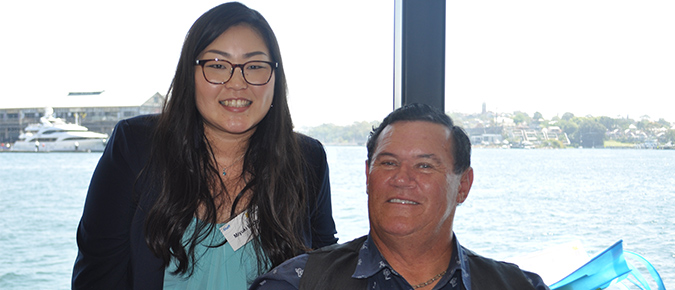
Matthew started life as a happy 'outback boy', living 320km inland from Port Hedland in Western Australia surrounded by red dirt. He was home schooled by radio school until the age of 12, as the drive from his front gate to his home took three and a half hours.
"If you put a city kid in my homestead they wouldn't survive," he recalls fondly.
At 13 years old, he went to a boarding school in Perth, which was almost a six-hour flight from home. Matthew recalls how different it was to see grass and a main street for the very first time.
He adapted to city life, surrounded by kids for the first time, and became a keen sportsperson and healthy, active young man. After school, he stayed in Perth to further his education and began studying Microbiology at university.
Facing a cancer diagnosis
In the middle of a university semester, Matthew collapsed on a sports field and his life completely changed. He hadn't been feeling too well, but the last thing he expected was a stomach cancer diagnosis.
Matthew said it took him a while to accept his diagnosis, and he struggled for a long time with the question of 'Why me?'.
He faced this nightmare at just 23 years of age.
Matthew endured nine months of chemotherapy. He recalls going "to the wars and back" and that the cancer diagnosis and treatment were the "hardest time for me".
It was the 1980s, a time when treatments were comparatively unsophisticated.
Getting through the challenges of treatment
He had difficulty adjusting to the treatments, he was "up and down like a yo-yo" for the first six months and lost a huge amount of weight. Luckily, his university was supportive and allowed him to take time off, but otherwise Matthew found there was a lack of support available and felt isolated.
"Chemotherapy was rough. In the early days of having cancer no-one really explained the side effects. Doctors couldn't explain why you lose your hair or why you lose your teeth," Matthew remembers.
He began experiencing depression as a result of the cancer and treatment. Unfortunately, awareness surrounding mental health was particularly poor, and he did not receive appropriate support.
Luckily Matthew has now been cancer free for over 30 years. He finished his studies and began working as a Forensic Specialist for the Australian Federal Police. In this role he worked across the country, as well as in Istanbul, Kuwait and London.
In 1991 he was posted in Albury for a case. Upon spending time with the 'fantastic community' Matthew was inspired to retire to Albury in 2004.
Despite having no family in Albury, Matthew has been embraced by the community and has hundreds of 'mothers and fathers', who 'keep an eye' on him. He believes he 'couldn't ask for anything better' then living in Albury.
Helping others with his experience
In retirement Matthew is busier than ever between helping homeless people, being the Verger of St Matthew's, and driving patients to Albury's cancer centre. He says he has been shaped this way by his own difficult cancer experience, and those of his 37 friends who have also been directly affected.
In 2007, he worked with his community to raise cancer awareness among young people by organising a Relay For Life team. That first year, there were 35 St Matthew's Angels; since they have participated every year and grown to 150-strong.
"The young ones are our future. They have to continue our work," Matthew believes.
Matthew is passionate about supporting those affected by cancer and is a strong advocate for research. "Research is very important. I had to go through cancer the old school way. Research makes it easier for people," he says.
Leaving a legacy that continues to help others
Driven by his belief in the importance of research, Matthew has chosen to leave a generous gift in his will of 80% of his estate to Cancer Council NSW.
He sees supporting Cancer Council as supporting the community, saying it's "a good cause and something I care for."
As he says, "if you haven't had cancer, someone in your life has or will."
Matthew celebrates the advances in treatment and support services made since his own cancer experience but knows more improvement is needed.
"We need research to prevent, and to help and make it easier for those who get cancer… to let people live longer. Hopefully people in the future won't have to go through the hell we did", says Matthew.






